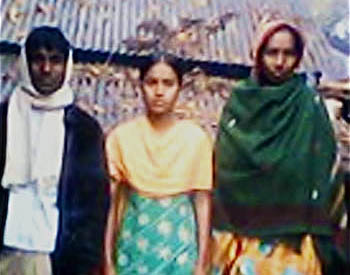

Preventing child marriage in Bangladesh

The parents of Sonia Khatun eke out a meager existence for themselves and their four children in the village of Charkosabari in northern Bangladesh. When Sonia turned 13, under the pressure of extreme poverty, they arranged for her to marry a shop owner from a neighboring village who was more than twice her age.
“I was convinced by my neighbors to arrange Sonia’s marriage, because I did not know about its harmful consequences, which I do not want for my daughter,” said her mother, Mosammad Monjuara Khatun. “I did not know about the existing laws against child marriage.”
Although the legal age for marriage is 18 for girls (21 for boys), child marriage is a common occurrence in Bangladesh, particularly among the poorest populations. According to UNICEF, about half of all Bangladeshi girls are married by the age of 15, and 60% become mothers by the age of 19.
Early pregnancy and childbirth limit a girl’s opportunities and often lead to health complications. Girls who marry young usually drop out of school and are more likely to remain poor. About half of teenage girls in Bangladesh suffer from malnutrition and anemia.
A better future for girls
The MDG-Fund is working to change the future for girls like Sonia. In partnership with the development organization BRAC, local government and NGOs, it has trained more than 25,000 men, women and adolescents to prevent child marriage, stop dowry practices and provide support for survivors of gender-based violence.
In Sonia Khatun’s case, a young local government worker who had been trained through the joint UN initiative learned of Sonia’s predicament and approached her mother. After he explained the negative physical and mental effects and legal consequences of child marriage, Monjuara Khatun spoke with her husband and relatives. The family agreed to break the betrothal, and Monjuara says she will now work to prevent child marriages elsewhere in her community.
Across the country, in southeastern Bangladesh, 15-year-old Farzana Akter learned through neighbors last year that her parents were planning to marry her off. She remembered that a local member of the Women’s Development Forum, Shefali Akter, had told the village girls to contact her if they needed help.
“I approached Shefali Akter for resolution of my marriage situation at home. Ms. Shefali took prompt action. She sat with my family, and after a long discussion, stopped the marriage,” says the 9th grader. “When I thanked her she said to me that I should give thanks to UNDP and BRAC who are running the program on violence in our area.”
Reaching communities through community-based advocates
Trainees like Shefali Akter and Mr. Ashrafujjaman, who intervened on Sonia Khatun’s behalf, are part of the MDG-Fund’s work to reduce widespread violence against women in Bangladesh, and part of its broader goal of helping countries reach the Millennium Development Goals (MDGs), including MDG #3, achieving Gender Equality.
Once trained, advocates disseminate success stories and work to end violence against women through yard meetings and other community gatherings. They also advocate with religious leaders to spread anti-violence messages during weekly prayer services.
So far, the initiative has prevented 33 child marriages, provided support for 80 women survivors of violence and stopped dowry practices in a number of communities.
Beyond these successes, the joint programme targets other Millennium Development Goals such as reducing poverty (MDG #1) by empowering women, increasing universal education (MDG #2) by revising the curriculum from a gender perspective, improving child and maternal health (MDGs #4 and #5) by providing better access to health care for women and girls, and combating HIV and AIDS (MDG #6) by addressing women’s vulnerability to contracting the virus.
For girls like Sonia and Farzana, the programme has had an immediate impact. “I am happy that I have escaped child marriage,” says Farzana. “I can pursue my dreams for a higher education now.”
Sonia, whose mother says she will not allow Sonia to be married off during the remainder of her childhood, says: 'I will study more to get a decent job to earn my livelihood. And only after that I will plan for marriage.”
Working together to reduce violence against women
The Joint Programme to Address Violence against Women in Bangladesh involves nine UN agencies, 11 government ministries and a large number of local development partnerg. It operates on three tiers: strengthening the policy and legal framework in order to reduce violence against women, changing attitudes of men, women and youth to affect behavior related to violence, and protecting survivors of gender-based violence.